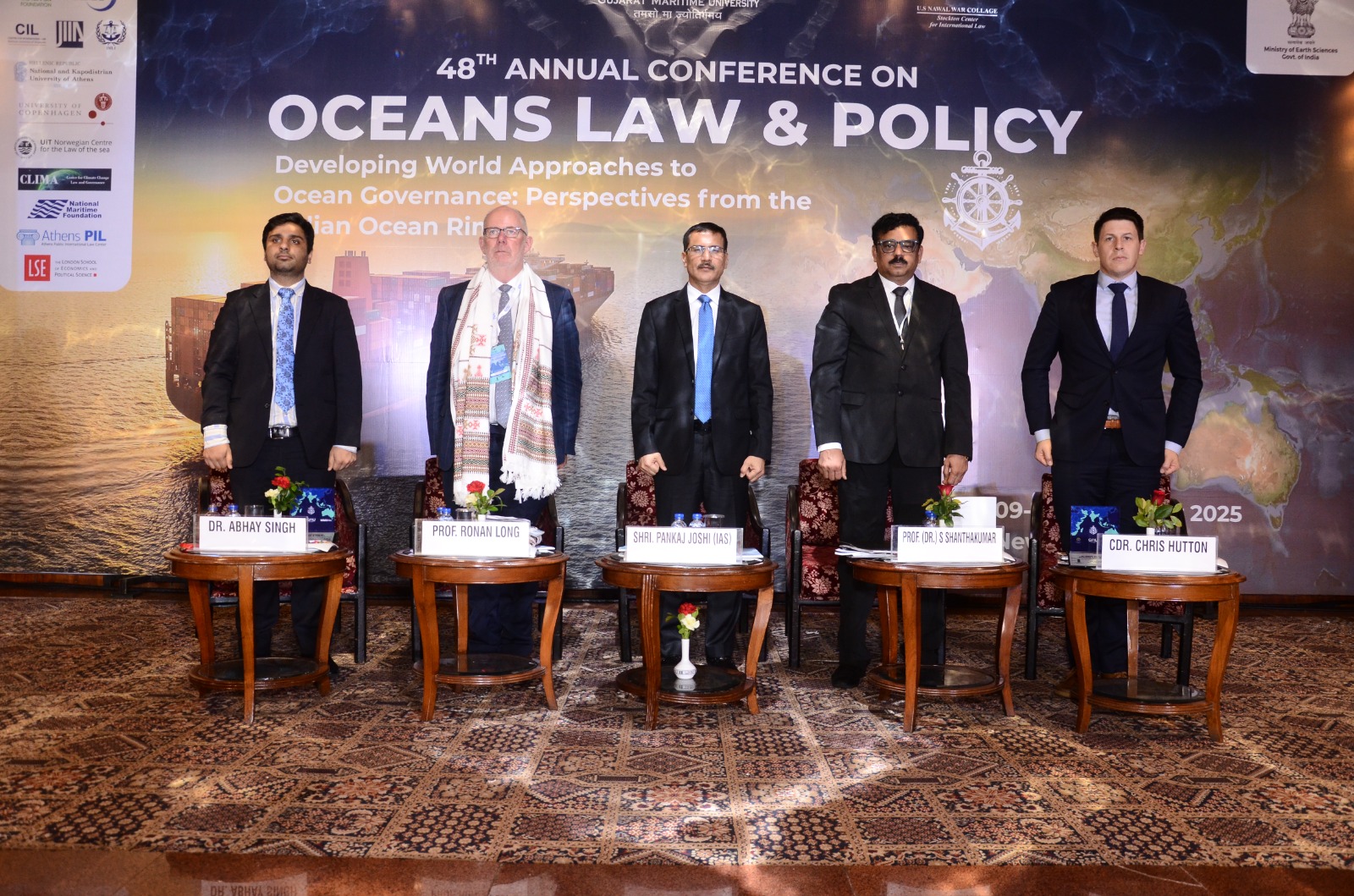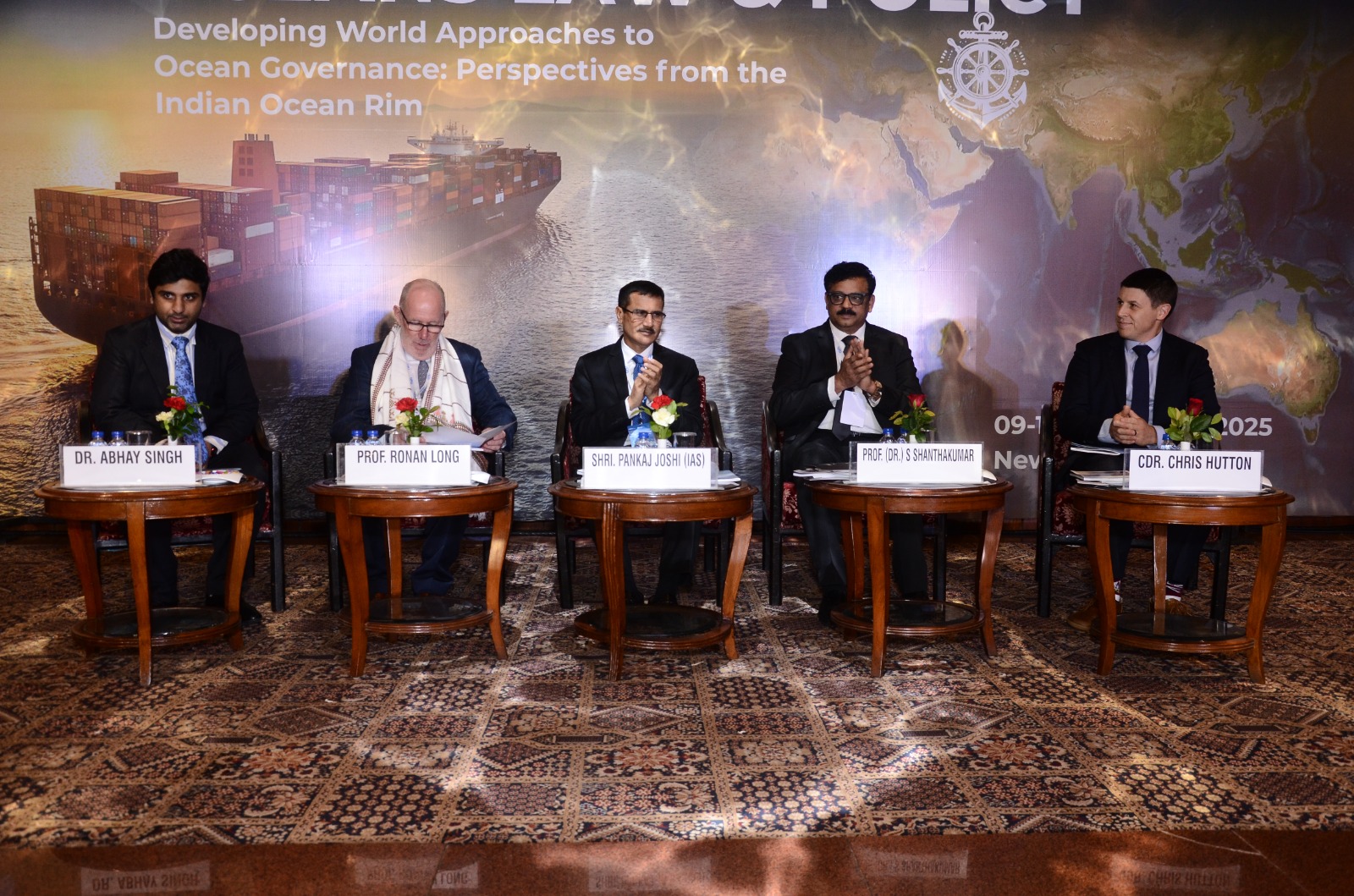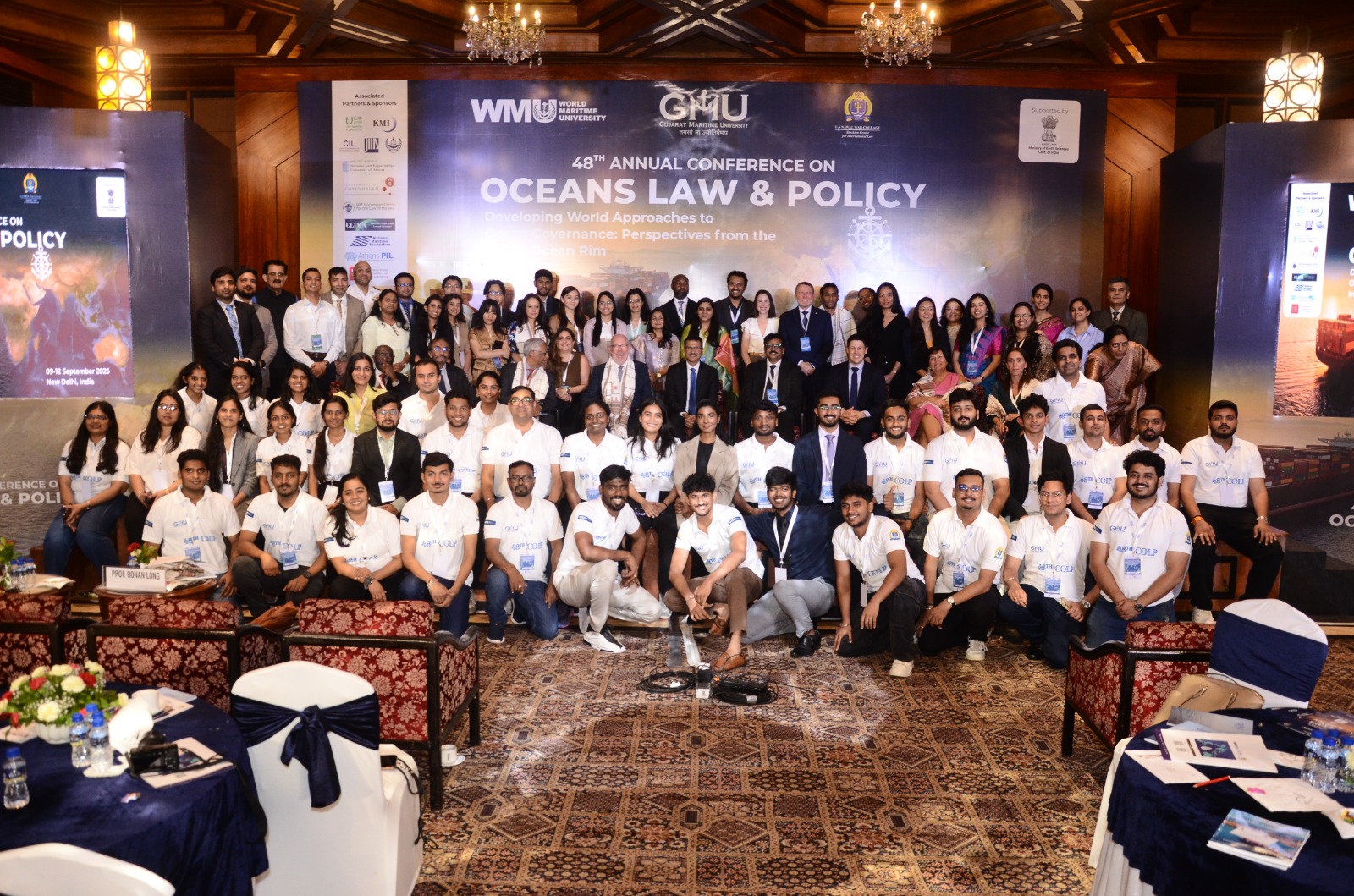
Historic 48th COLP concludes in New Delhi with renewed global commitments to Ocean Governance
NEW DELHI : Three-Day Maritime Dialogue establishes India as Key Leader in International Ocean Law and Policy. The 48th Conference on Oceans Law and Policy (COLP48) drew to a close on Thursday in the capital, after three days of intensive deliberations that brought together some of the world’s leading voices in maritime law, diplomacy, policy, and science. Hosted by Gujarat Maritime University (GMU) at The Ashok Hotel, the conference marked a historic milestone for India, which became the first nation in the Indian subcontinent to host the world’s longest-running global forum on oceans law and policy.
The conference, carrying the theme “Developing World Approaches to Ocean Governance: Perspectives from the Indian Ocean Rim,“ brought together government officials, diplomats, scholars, students, and maritime professionals from across the globe, all united by a common purpose: advancing better protection and governance of the world’s oceans.
Opening of the Final Day

The final morning of COLP48 carried both anticipation and reflection as delegates gathered for the concluding sessions. Dr. Abhay Singh Thakur, Director, School of Maritime Law Policy Administration (SMLPA), Gujarat Maritime University, offered brief housekeeping remarks, guiding the audience into the day’s proceedings.
Prof. James Kraska, Chair of Stockton Center for International Law, US Naval War College, appearing virtually, delivered a thoughtful welcome address and reflection on the conference. He hailed COLP as “the most consequential academic forum on the law of the sea,” thanking GMU, GNLU, and the extensive network of international partners. Urging delegates to be bold in their questions and generous in their listening, he noted: “The oceans connect us all – sustaining our economies, security and the planet’s health. The work we do here will echo far beyond this room.”
Valedictory Session: Reflecting on Historic Achievements
The final session reflected the significance of the discussions that had taken place over three intensive days. Prof. (Dr.) S. Shanthakumar, Provost of Gujarat Maritime University, presented the comprehensive conference report, distilling days of dialogue, debate, and consensus-building.
“It is a profound honour to deliver the closing reflections at this historic gathering. For decades, COLP has stood as the world’s longest-running forum on oceans law and policy, and for the first time it has been hosted in India. Together we have travelled from ceremonial openings to technical sessions, exploring not only the challenges but also the opportunities before us,” Prof. Shanthakumar observed.
Summarizing the extensive panels and workshops, he highlighted how discussions ranged from the BBNJ agreement and biodiversity conservation to international trade, shipping, deep-sea mining, autonomous systems, food security, and dispute settlement. “While the Indian Ocean faces complex challenges – from climate change to resource exploitation and geopolitical tensions – it also offers tremendous opportunities for leadership, innovation, and solidarity among developing states.”
Thanking GMU faculty, students, and partners worldwide, Prof. Shanthakumar added: “This conference has been a powerful reminder of what’s possible when we come together. The insights shared here will shape practice and policy across the Indian Ocean Rim. Let this be the first of many such gatherings as we chart a safer, more sustainable, and more prosperous maritime future.”
International Partnership and Collaboration Praised
Prof. Ronán Long, Director, World Maritime University–Sasakawa Global Ocean Institute, offered heartfelt concluding remarks: “This has been an immense success — perhaps the best-curated conference in nearly half a century. What I will carry away from Delhi is the warmth, the hospitality, and above all the extraordinary talent of GMU’s students and alumni. They not only supported the event but enriched it with their energy and cultural contributions.”
He thanked colleagues across GMU, WMU, and the Stockton Center for their collaboration, noting: “From months of planning to these three days of scholarship, every effort has been worthwhile. The spirit of international law is very much alive in this region, and that is essential when the global rule of law is under challenge.”
Prof. Long emphasized that the deliberations would continue beyond Delhi, including at the upcoming Seychelles workshop, stating: “I leave Delhi with new friends and great confidence in the next generation of ocean leaders.”
Commander Christopher Hutton, representing the Stockton Center for International Law, US Naval War College, offered succinct closing remarks: “On behalf of Admiral Walker and Professor James Kraska, I extend our deepest gratitude to GMU, WMU, our partners, moderators, and sponsors – and especially to the infectiously enthusiastic GMU students whose hard work made this event possible. The future of Indian law is incredibly promising if you are a reflection of your community.”
Government Leadership and Regional Vision
Shri Pankaj Joshi (IAS), President of Gujarat Maritime University and Chief Secretary, Government of Gujarat, delivered concluding remarks that acknowledged the collaborative spirit and responsibilities of the developing world: “For the nations of the Indian Ocean, our relationship with the sea is not just about sovereignty or resources – it is a matter of survival, economic prosperity, and cultural heritage. While we face the immense challenges of climate change, IUU fishing, and marine pollution, the Indian Ocean also presents immense opportunities through the Blue Economy.”
He emphasized the critical balance required in policy-making: “Our task is to shape policies that balance development with conservation, ensuring that the ocean remains a foundation of stability, cooperation, and sustainable growth.”
Note: The scheduled Valedictory Address by Shri Sarbananda Sonowal, Union Minister of Ports, Shipping and Waterways, could not take place as the Minister was called to Assam on urgent business.

Comprehensive Coverage of Ocean Governance Issues
Over three days, COLP48 explored a wide spectrum of critical issues, with experts, diplomats, and practitioners contributing across multiple sessions. The conference highlighted the urgent need for collaborative, equitable, and sustainable approaches to governing shared ocean spaces, covering topics from the triple planetary crisis and maritime security to emerging technologies and international dispute settlement.
Academic Legacy and Future Impact
A key outcome of the conference is the announcement that its proceedings will be published in an edited volume titled “Developing World Approaches to Ocean Governance: Perspectives from the Indian Ocean Rim.” The publication, co-edited by Prof. James Kraska, Prof. Ronán Long, and Prof. (Dr.) S. Shanthakumar, will consolidate the debates, recommendations, and policy suggestions put forth during COLP48, ensuring the conference’s impact extends far beyond Delhi.
India’s Growing Maritime Leadership
The conference concluded with a networking reception, where delegates and dignitaries reflected on the discussions and renewed their commitments to cooperative action. For India, hosting COLP48 not only highlighted its growing leadership in global maritime affairs but also placed the Indian Ocean firmly at the center of conversations on international law and policy.
Clear Message for Future Action
As participants departed New Delhi, the message from COLP48 was unambiguous: the challenges facing the world’s oceans cannot be addressed in isolation. The Indian Ocean Rim, home to some of the world’s fastest-growing economies and most vulnerable coastal states, must remain at the forefront of global maritime governance discussions.
The success of COLP48 in New Delhi has established a new benchmark for international ocean law conferences and positioned India as a crucial voice in shaping the future of global ocean governance. The conference’s legacy will continue through ongoing collaborative efforts among the international partners and the implementation of the innovative approaches to ocean governance discussed during these historic three days

